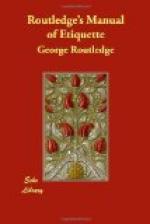It is in a host of little things such as these that good taste lies, and shows itself. We remember an instance of a lady, who was conspicuous among her fellows for her exquisitely good taste in dress, being severely commented upon by two showily-dressed women, who were the wives of wealthy merchants in one of our great seaport-towns. This lady appeared in church quietly dressed in black, with a handsome Indian shawl, of which the colours were subdued and wonderfully blended. The two representatives of the “nouveaux riches” looked at the lady and then at each other; they turned up their noses, and shrugged their shoulders, and gave vent to their feelings, as they came away from church, in loud exclamations of disdain: “Well! did you ever? No! I never did; and she a lady too! For their part they would be ashamed to wear such a shabby old shawl.” The shawl was worth about its weight in gold; but because it was not showy, it found no favour in their eyes.
As it is so intricate a matter, and one of which a very slight thing can turn the scales, it is not easy to lay down rules by which good taste may be acquired. But there are instances of bad taste which can be avoided, and among them there is one which is self-evident, and does not relate either to harmony or to variety of colours. We allude to the good taste of dressing according to our means and station.
There is an impression in the minds of some persons, that fine feathers make fine birds, and that the world in general thinks more or less of them according to the dress they wear. Therefore, in order that they may impose upon their neighbours by their outward appearance, and, as children say, make-believe that they are richer than they really are, they dress beyond their means, and, at the cost of much privation of even the necessaries of life, make a display which they are not warranted in making. We have known those who have pinched themselves till they have brought on actual illness, or have laid the foundation of a fatal disease, in order that they might dress themselves in a style beyond their position in life. In France this is often the case. A lady who, in her ordinary attire, is as slovenly and as shabbily dressed as almost the very beggar in the street, will appear at some evening party most exquisitely dressed, and will carry on her back the savings acquired by months and years of penurious self-denial.
We respect those who struggle hard to maintain their hereditary position, and reverence within certain limits the spirit of endurance which bears in privacy the changes of fortune in order to keep up a becoming appearance in the eyes of the world. But we have no sympathy for those who, having no such excuse, having no high lineage, and to whom fortune has not been unkind, stint and screw that they may impose upon their neighbours with the notion that they are better off than they really are,—better off in money, and better off in position. Imposture




